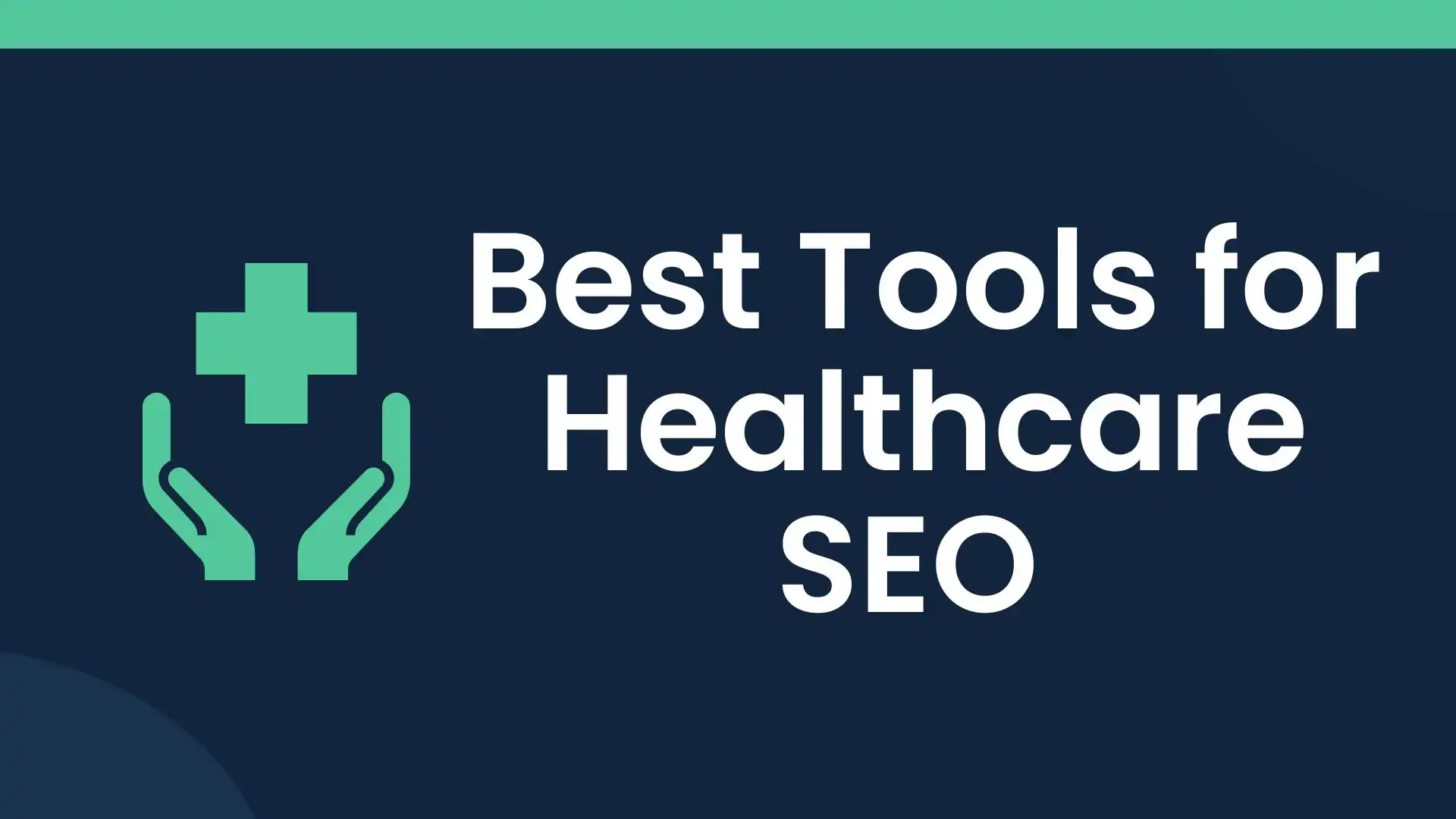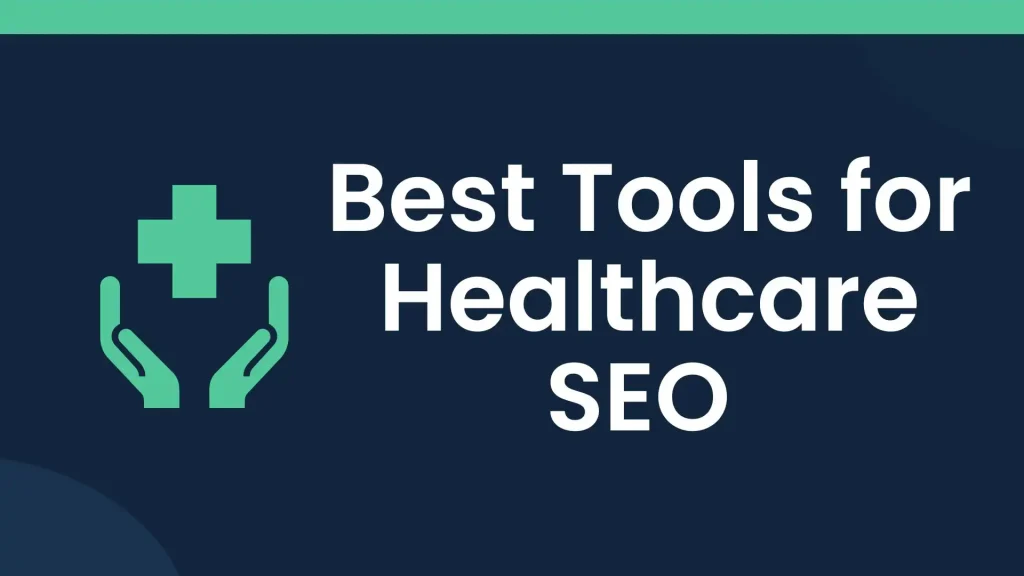
Best Tools for Healthcare SEO in 2025
Table of Contents
The healthcare sector is witnessing unprecedented digital transformation, and having a strong online presence has become a necessity for hospitals, clinics, and medical professionals. Patients increasingly turn to search engines to find reliable healthcare services, making effective SEO strategies essential.
At Digiwalebabu, where we specialize in SEO services in India, we understand that Healthcare SEO demands a careful balance of local optimization, content authority, and adherence to medical standards.
This guide presents the most powerful tools for Healthcare SEO in 2025, helping healthcare providers boost visibility, attract patients, and strengthen their online reputation.
Why Healthcare SEO is Important in 2025
Healthcare SEO is the process of optimizing a medical website to rank higher in search engine results. Patients today rely heavily on search engines to find healthcare services, from general practitioners to specialized treatments.
`A well-executed Healthcare SEO strategy ensures that your clinic or hospital appears in relevant searches, builds patient trust, and increases appointment bookings.
Key benefits of Healthcare SEO include:
- Enhanced Visibility: Appearing on the first page of Google ensures more patients find your healthcare services.
- Local Patient Acquisition: SEO helps local searches, bringing patients directly to your clinic or hospital.
- Credibility and Trust: High-ranking healthcare websites build authority and trust among patients.
- Better User Experience: SEO improves website navigation, content structure, and mobile responsiveness.
Given its importance, choosing the right tools for Healthcare SEO in 2025 is essential for long-term success.
Top Tools for Healthcare SEO in 2025
To stay ahead in the healthcare industry, using advanced SEO tools is not optional—it is essential. The following are the best tools for Healthcare SEO in 2025, categorized by their functionality:

1. Keyword Research Tools
Keyword research is the backbone of Healthcare SEO, helping target patients searching for specific medical services.
Top tools like SEMrush, Ahrefs, Google Keyword Planner, and Ubersuggest provide keyword ideas, trends, and competitor insights. These tools help discover high-intent keywords, target long-tail searches, and identify trending healthcare topics.
Best keyword research tools include:
- SEMrush: A comprehensive tool that provides high-volume medical keywords, search trends, and keyword difficulty scores.
- Ahrefs: Excellent for analyzing competitor websites, finding long-tail medical keywords, and discovering content gaps.
- Google Keyword Planner: Free and highly reliable, it helps discover local healthcare-related keywords and patient queries.
- Ubersuggest: Provides keyword suggestions, search volume, and trends specific to healthcare.
Benefits for Healthcare SEO:
- Helps discover high-intent patient search terms.
- Enables targeting of long-tail keywords like “best cardiologist in Bangalore.”
- Assists in identifying seasonal or trending medical topics.
2. On-Page SEO Tools
On-page SEO ensures Healthcare SEO pages are optimized for search engines while delivering value to visitors.
Tools like Yoast SEO, Rank Math, and Screaming Frog help optimize meta tags, readability, schema, and detect technical issues. Key practices include using structured data, fast loading pages, mobile-friendly design, and strategic internal linking.
Top on-page SEO tools for Healthcare SEO in 2025:
- Yoast SEO (WordPress): Optimizes meta tags, readability, and schema markup for healthcare websites.
- Rank Math: Offers advanced on-page SEO suggestions and schema support for medical content.
- Screaming Frog SEO Spider: Crawls websites to identify broken links, duplicate content, and on-page SEO issues.
On-Page Optimization Checklist for Healthcare SEO:
- Optimize meta titles and descriptions with targeted healthcare keywords.
- Use structured data (Schema.org) for medical services, doctor profiles, and reviews.
- Ensure fast page load speed and mobile responsiveness.
- Include internal linking to related services or blog content.
3. Technical SEO Tools
Healthcare websites have complex structures with multiple services and resources, making technical SEO crucial.
Tools like Google Search Console, Ahrefs Site Audit, GTmetrix, and Siteliner help identify crawl errors, broken links, and speed issues. Optimizing site structure, security (HTTPS), and mobile-friendliness ensures a healthy website for Healthcare SEO.
Must-have technical SEO tools for Healthcare SEO:
- Google Search Console: Monitors indexing, search performance, and technical issues.
- Ahrefs Site Audit: Detects crawl errors, broken links, and duplicate content.
- GTmetrix: Analyzes website speed and provides optimization recommendations.
- Siteliner: Identifies duplicate content and internal linking issues.
Key Technical SEO Tips for Healthcare Websites:
- Ensure all medical pages are indexed and mobile-friendly.
- Use HTTPS for secure patient data handling.
- Create XML sitemaps and submit them to Google Search Console.
- Fix crawl errors, broken links, and redirect chains promptly.
4. Local SEO Tools
Local SEO is essential for Healthcare SEO as patients often search for nearby services. Tools like Google My Business, BrightLocal, Whitespark, and Moz Local help manage listings, reviews, and citations.
Best practices include optimizing GMB profiles, encouraging patient reviews, and using location-based keywords on service pages.
Top Local SEO tools for Healthcare SEO:
- Google My Business (GMB): Essential for local listings, patient reviews, and map visibility.
- BrightLocal: Monitors local search rankings, citations, and reviews for healthcare practices.
- Whitespark: Helps identify local citation opportunities and manage online reputation.
- Moz Local: Ensures accurate business listings across search engines and directories.
Local SEO Tips for Healthcare SEO:
- Claim and optimize your Google My Business profile.
- Encourage satisfied patients to leave reviews online.
- Use location-based keywords in service pages, such as “pediatrician in Delhi.”
- Ensure NAP (Name, Address, Phone number) consistency across all platforms.
5. Content Optimization Tools
Accurate, informative content is vital for Healthcare SEO, and optimization tools make this easier. Tools like Clearscope, SurferSEO, Grammarly, and MarketMuse improve keyword usage, readability, and content relevance.
They help create patient-focused, well-structured content that ranks higher and builds trust.
Best tools for Healthcare SEO content optimization:
- Clearscope: Optimizes content for relevant medical keywords and improves readability.
- SurferSEO: Suggests keyword density, semantic keywords, and content structure improvements.
- Grammarly: Ensures error-free and professional healthcare content.
- MarketMuse: Provides AI-driven content recommendations to cover relevant healthcare topics comprehensively.
Healthcare Content SEO Tips:
- Use authoritative medical sources to ensure credibility.
- Include FAQs addressing patient queries.
- Optimize for featured snippets and voice search.
- Maintain natural keyword usage for better ranking.
6. Backlink and Link-Building Tools

High-quality backlinks boost authority and trust in Healthcare SEO. Tools like Ahrefs, SEMrush Backlink Analytics, Majestic SEO, and BuzzSumo help track links, analyze competitors, and find opportunities.
Effective strategies include partnering with authoritative sites, guest posting, and creating shareable healthcare content.
Top backlink tools for Healthcare SEO in 2025:
- Ahrefs: Tracks backlinks, analyzes competitor links, and finds link-building opportunities.
- SEMrush Backlink Analytics: Monitors domain authority and link acquisition strategies.
- Majestic SEO: Evaluates link trust flow and citation flow for healthcare domains.
- BuzzSumo: Identifies trending healthcare content and potential link partnerships
Effective Link-Building Tips for Healthcare SEO:
- Partner with authoritative medical blogs or health portals.
- Publish guest posts on reputable healthcare websites.
- Create shareable infographics and research reports.
- Avoid low-quality links to maintain trustworthiness.
7. Analytics and Reporting Tools
Monitoring performance is key for Healthcare SEO success, and analytics tools provide actionable insights.
Tools like Google Analytics, SEMrush Position Tracking, Hotjar, and Matomo track traffic, engagement, and keyword performance.
Use these insights to monitor growth, identify top-performing content, and adjust SEO strategies effectively.
Best analytics tools for Healthcare SEO:
- Google Analytics: Tracks patient behavior, traffic sources, and conversions.
- SEMrush Position Tracking: Monitors keyword rankings and visibility over time.
- Hotjar: Provides heatmaps and session recordings to understand user interaction.
- Matomo Analytics: Offers privacy-compliant analytics for healthcare websites.
Analytics Tips for Healthcare SEO:
- Track organic traffic growth and local search visibility.
- Monitor patient engagement on service pages and blogs.
- Identify high-performing keywords and content topics.
- Adjust SEO strategies based on data-driven insights.
8. Review and Reputation Management Tools
Patient reviews play a major role in Healthcare SEO, affecting trust and local rankings. Tools like Birdeye, Podium, and Reputation.com help collect, monitor, and manage reviews across platforms.
Best practices include requesting reviews, responding professionally, displaying verified reviews, and ensuring consistent service information online.
Top review management tools for Healthcare SEO:
- Birdeye: Collects and monitors patient reviews across platforms.
- Podium: Helps respond to reviews and manage patient interactions efficiently.
- Reputation.com: Tracks online reputation and improves local SEO signals.
Reputation Management Tips:
- Request patients to leave reviews after consultations.
- Respond promptly to negative reviews with professionalism.
- Display verified reviews on your website.
- Ensure consistency of healthcare service information across review platforms.
9. AI and Automation Tools
AI-powered tools enhance efficiency in Healthcare SEO by saving time and providing predictive insights. Tools like ChatGPT, Jasper AI, SurferSEO AI, and Clearscope AI help generate content, optimize keywords, and plan trending topics.
Best practices include automating reporting, creating patient-focused content, and ensuring medical accuracy.
AI Tools for Healthcare SEO in 2025:
- ChatGPT / Jasper AI: Helps generate content ideas, meta descriptions, and FAQs efficiently.
- SurferSEO AI Integration: Offers AI-assisted content optimization for healthcare topics.
- Clearscope AI Features: Suggests semantic keywords and content improvements automatically.
AI Tips for Healthcare SEO:
- Use AI to generate patient-focused content efficiently.
- Automate reporting and keyword tracking.
- Predict trending medical topics for content planning.
- Ensure AI content maintains accuracy and medical authority.
10. Comprehensive SEO Platforms
All-in-one SEO platforms simplify Healthcare SEO management for healthcare businesses. Tools like SEMrush, Ahrefs, and Moz Pro offer keyword research, site audits, backlink analysis, and local SEO tracking.
They enable centralized campaign management, efficient reporting, integrated SEO efforts, and real-time competitor monitoring.
Top platforms for Healthcare SEO:
- SEMrush: Combines keyword research, backlink analysis, technical SEO, and content optimization.
- Ahrefs: Offers full-site audits, keyword research, competitor analysis, and link-building tools.
- Moz Pro: Provides comprehensive local SEO management, site audits, and keyword tracking.
Benefits of All-in-One Platforms:
- Centralized management of SEO campaigns.
- Time-efficient tracking and reporting.
- Better integration of content, technical, and local SEO efforts.
- Ability to monitor competitor strategies in real-time.
Best Practices for Healthcare SEO in 2025
To maximize Healthcare SEO results, focus on user experience, ensuring fast, mobile-friendly, and easy-to-navigate websites.
Optimize for local searches, publish authoritative content, use structured data, and monitor performance through analytics tools. Build trust by acquiring high-quality backlinks and proactively managing your online reputation.
- Focus on User Experience: Ensure websites are fast, mobile-friendly, and easy to navigate.
- Optimize for Local Searches: Prioritize location-specific keywords and Google My Business listings.
- Prioritize Content Quality: Publish accurate, authoritative, and patient-focused content.
- Use Structured Data: Implement medical schema for services, reviews, and practitioner profiles.
- Monitor Performance: Use analytics and reporting tools to adjust strategies based on real data.
- Build Trust and Authority: Acquire high-quality backlinks and manage online reputation proactively.

People Also Ask About Best Tools for Healthcare SEO in 2025
What is Healthcare SEO and why is it important?
Healthcare SEO is the practice of optimizing medical websites to rank higher in search engines. It helps clinics, hospitals, and doctors attract more patients and build online trust.
Which tools are essential for keyword research in Healthcare SEO?
SEMrush, Ahrefs, Google Keyword Planner, and Ubersuggest are top tools for discovering high-intent medical keywords and content opportunities.
How can on-page SEO tools improve a healthcare website?
Tools like Yoast SEO, Rank Math, and Screaming Frog optimize meta tags, readability, structured data, and internal linking to enhance search visibility.
Why is local SEO crucial for healthcare providers?
Most patients search for nearby services. Local SEO tools like Google My Business, BrightLocal, and Moz Local help practices appear in map listings and local searches.
What role do content optimization tools play in Healthcare SEO?
Content optimization tools such as Clearscope, SurferSEO, and MarketMuse improve keyword usage, readability, and content relevance, making medical content more discoverable.
How do backlinks impact Healthcare SEO?
High-quality backlinks signal authority to search engines. Tools like Ahrefs, SEMrush, and BuzzSumo help track, analyze, and build credible link sources.
Which analytics tools are best for tracking healthcare SEO performance?
Google Analytics, SEMrush Position Tracking, Hotjar, and Matomo provide insights into traffic, user engagement, and keyword performance.
How can healthcare providers manage online reviews effectively?
Tools like Birdeye, Podium, and Reputation.com help collect, monitor, and respond to patient reviews, which are key for local rankings and trust.
Can AI tools improve Healthcare SEO efficiency?
Yes, AI tools like ChatGPT, Jasper AI, and SurferSEO AI help generate content, optimize keywords, plan topics, and automate reporting.
Are all-in-one SEO platforms worth using for healthcare websites?
Absolutely. Platforms like SEMrush, Ahrefs, and Moz Pro centralize keyword research, audits, backlinks, and local SEO, saving time and improving overall strategy.
Conclusion
In 2025, Healthcare SEO is more competitive than ever. Healthcare providers must leverage the right mix of tools to improve search visibility, attract patients, and establish trust. From keyword research to local SEO, content optimization, and analytics, the tools listed above are essential for a successful Healthcare SEO strategy.
